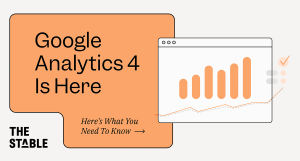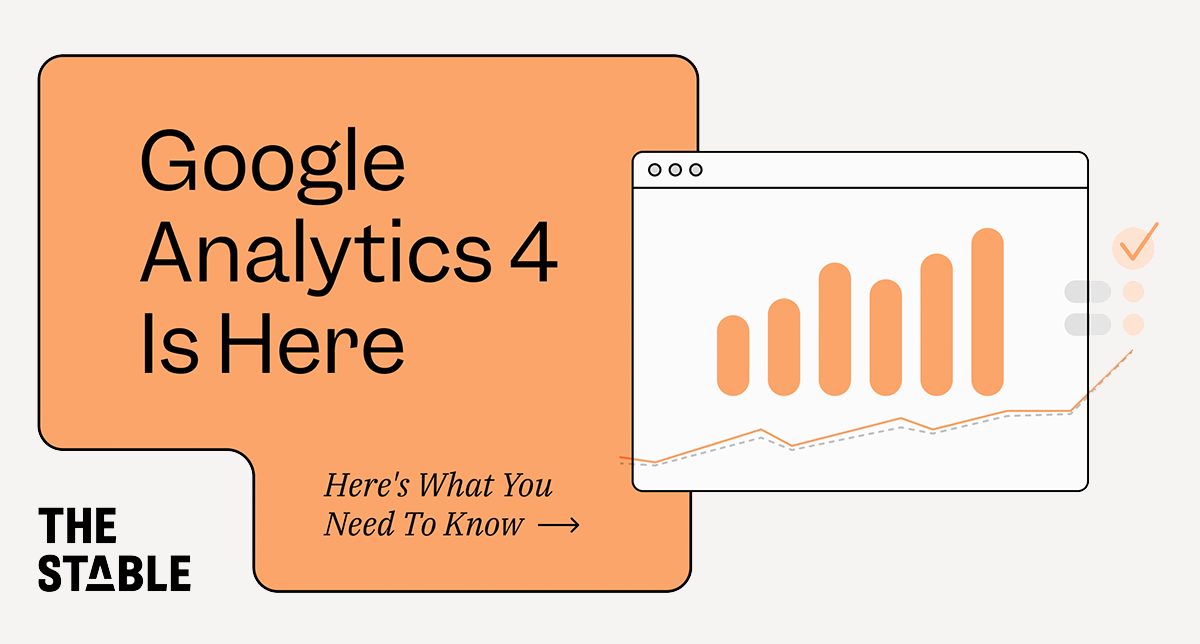Category
Tags
The questions on every digital marketer’s mind right now: when and how do I set up Google Analytics 4 (GA4)? And, is it worth thinking about yet? Let’s discuss.
On July 1st 2023, Google’s standard Universal Analytics measurement properties will be deprecated, meaning it will stop processing new data. Google Analytics 4 (GA4) will take its place as Google’s new measurement protocol for tracking website data, and operates off a fundamentally different data model that is more flexible and expansive.
Long story short, for eCommerce businesses this means that:
- Brands need to take action prior to July 2023
- We suggest you take action now, in order to retain as much year-over-year and look-back data as possible (contact us here for help!)
- GA4 is good news for your business, and we’re here to tell you why
We’re about to give you a thorough review of GA4, but first, we want to address the timeframe.
July 2023 might feel like a date in the very distant future. However, if brands don’t make the move to GA4 soon, they’ll lose the ability to track year-over-year (YoY) and look-back data for every month that passes between now and July 2023.
Just think about it…
- Currently in Universal Analytics, you can track YoY data comparing every month of 2022 vs. 2021, right?
- With the mandated move to GA4 in July 2023, you won’t be able to compare July 2023 to July 2022, unless you make the move to GA4 now
- This is because after July 1st, 2023, Google’s standard Universal Analytics properties will no longer process data
- And this problem is only going to get worse, the longer you wait
But enough of this fear mongering; let’s talk through the benefits of GA4 and why this is ultimately going to be good news for your business. And, if you decide that you’re ready to make the move to GA4 now, we’re here to help. Contact us here for more info.
The Benefits of Google Analytics 4
GA4 is the next generation of Google Analytics, and is designed for the future of measurement:
- Collects both website and app data to help brands better understand their unique customer journeys
- Is event-based rather than session-based to provide more granular data and better control over data privacy
- Includes privacy controls, such as cookieless measurement, as well as behavioral and conversion modeling
- Includes direct integrations to media platforms to help drive faster and smarter action
“With GA4, brands can leverage features that were previously only offered to paying Google Analytics 360 customers,” says Corey Zalewski, VP of Data and Analytics at The Stable. “For example, GA4 provides free access to Google BigQuery linking which unlocks the ability to develop custom reporting models using the power of SQL and BigQuery.”
Here are some of the GA4 benefits we are excited for (and why you should be too):
1) Unlimited and unsampled data:
Previously, Universal Analytics applied a monthly limit of 10 million hits per property in terms of the amount of data that could be collected. This left brands often working with incomplete information, because they were forced to rely on sampled data.
GA4 eliminates sampling from standard reports, and data collection is now unlimited. Having access to unsampled data ensures that brands are basing their decisions on reliable and complete data sets, which is a huge benefit that should not be understated.
2) Free BigQuery integration:
BigQuery is a data warehouse that allows for the processing of SQL queries at high speeds using Google’s powerful infrastructure. Originally available only to paying GA360 users, BigQuery is now accessible through GA4, to all users, for free. The free data allowance provides brands with 10GB of free storage and free processing of up to 1TB of query data.
By linking Google Analytics and BigQuery, all data can be stored unaggregated, which means it can be manipulated or transformed in BigQuery, and then easily loaded into other data warehouses.
3) Enhanced visualization and reporting capabilities:
Although the user interface is similar between Universal Analytics and GA4, there are several new visualizations and reporting functions available in GA4. One example is the ‘Analysis Hub’, which features a fast, customizable template gallery and helps simplify some of the more complex cross-dimensional metric reporting.
In addition, GA4 allows for more user-centric reporting which is hugely beneficial to direct-to-consumer (DTC) and eCommerce brands, including the ability to report on things like user acquisition, customer lifetime value (LTV), and user-generated revenue.
4) Extended segmentation:
Audiences in GA4 allow for more targeted segments. Brands will now be able to create segments based on events, which means that they can focus more on users and interactions.
GA4 also allows you to embed “time” into segments, meaning that brands will be able to analyze things like the time users spend between stages in their sales cycle, or the average time from a user’s first visit all the way to purchase.
And finally, any published audience will automatically be shared with Google Ads, meaning that the precise audience you want to reach will be there when you are ready to launch a campaign.
5) Access to complete user journeys:
GA4 makes it easier than ever to zero in on customer behavior and understand where brands should direct more attention or shift marketing strategy.
Within GA4, there is a new section called “Life Cycle,” where reports on acquisition, engagement, monetization, and retention are available. These will allow brands to understand how they are tracking against revenue goals and if they are gaining customer loyalty, while also assessing customer retention progress as well.
6) New engagement metrics:
GA4 can help brands get up-to-speed on the latest and greatest in eCommerce data-tracking and measurement standards. With the expanded insight-driving and learning potential that can be derived from customers’ real-time shopping experiences, GA4 will evolve brands’ understanding of customer purchase behavior.
In addition, enhanced measurement events, such as scroll, site search, video engagement, and file downloads, let brands know exactly how users are interacting with their site and content. Tracking like this in Universal Analytics currently requires considerable custom coding.
7) More intelligent privacy and security enhancements:
As new, and stricter, privacy laws are implemented by global governments and regulatory organizations, it is becoming increasingly difficult to track users with cookies. That’s why GA4 is designed for a future with or without cookies. It uses a flexible approach to measurement, and includes modeling to fill in the gaps where data may be incomplete.
In addition, IP anonymization is enabled by default with GA4, which eliminates the collection of users’ personal data.
8) Predictive metrics:
GA4 allows brands to more accurately predict which users are likely to buy, and how much revenue will come from future conversions. Three predictive metrics are introduced in GA4:
- Purchase probability: the probability that a user who has been active in the last 28 days will make a purchase within the next 7 days
- Churn probability: the probability that a user who was active within the last 7 days will be inactive within the next 7 days
- Revenue prediction: the expected revenue within the next 28 days from a user who has been active in the past 28 days
Brands can use these metrics to create predictive audiences that can then be targeted through campaigns during critical periods in terms of conversion likelihood.
How To Setup Google Analytics 4
This might be the question you’re asking by this point, especially knowing that GA4 requires a more technical implementation than Universal Analytics. That being said, “GA4 is the ideal way to future-proof your data collection practices since the nature and flexibility of its event-based tracking offers a more expansive format to collect and analyze data,” Zalewski continues.
Our Analytics and Insights Team is ready to help you implement GA4 and/or get the most out of your existing Universal Analytics before it is deprecated in July 2023. Contact us today to learn more about our GA4 enablement service options.




